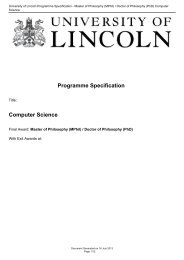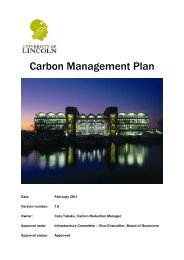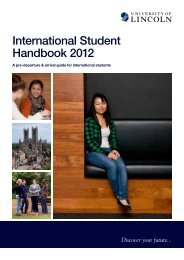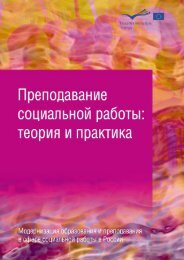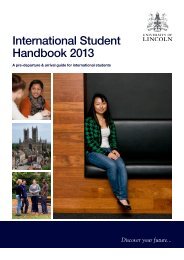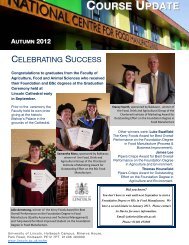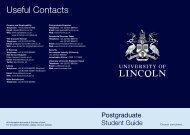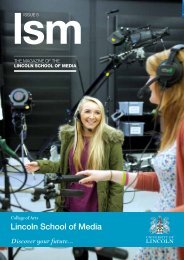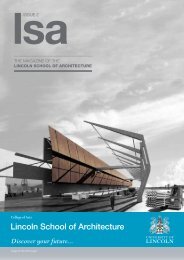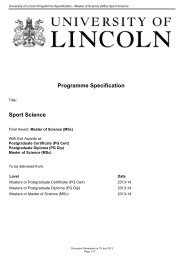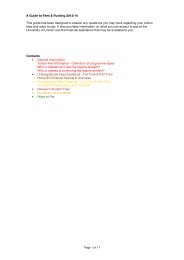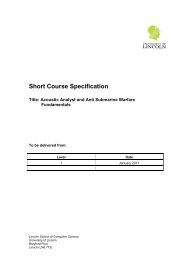LSH Magazine Issue 4 (PDF) - University of Lincoln
LSH Magazine Issue 4 (PDF) - University of Lincoln
LSH Magazine Issue 4 (PDF) - University of Lincoln
- No tags were found...
Create successful ePaper yourself
Turn your PDF publications into a flip-book with our unique Google optimized e-Paper software.
BA (Hons)HistoryHistory jointdegreesHere at <strong>Lincoln</strong> we <strong>of</strong>fer a History programme which is popularand wide-ranging. The degree covers subjects ranging from themedieval period to the contemporary and from the local to theUS and China, reflecting the broad research interests <strong>of</strong> staff.We think it is important that youdevelop your own interests and thatyou can choose options which exciteyou. After a shared first year, youcan partly build your own pathwaysthrough a range <strong>of</strong> option choicesand start to develop a specialismthrough the Independent Study inyour third year. We have built in theopportunity for you to experience avariety <strong>of</strong> approaches to History, usinga range <strong>of</strong> investigative techniques, forexample oral history and quantitativeand qualitative methods.Our aim is to produce graduateswho are skilled historians with acritical approach to their subject butalso highly employable individuals,with skills in independent thought,the ability to summarise andanalyse critically complex bodies <strong>of</strong>information, to communicate clearlyand concisely in both written and oralformats, and to work under pressureto deadlines either on their own or ingroups. While we try and develop skillsthrough the subject content, we alsomake space for students to preparefor the world <strong>of</strong> work ahead; there is adedicated module for career planningin the second year and a workplacement option to be undertakenbetween the second and third years.<strong>Lincoln</strong> is an ideal location inwhich to study History, and in theprogramme we use its resources fully.Modules include visits to the castleand cathedral, and students areencouraged to use the documentsheld by <strong>Lincoln</strong>shire Archives andthe Cathedral Library.Staff pr<strong>of</strong>ile:Dr Anna Marie RoosSenior Lecturer in HistoryIf you would prefer to study a morebroadly-based programme, one <strong>of</strong>the History joint honours degrees maybe for you. English and History is themost popular <strong>of</strong> these, with manystudents choosing to combine the twohumanities subjects; especially thoseconsidering teaching as a career. Youcan also study History with Politics.In each <strong>of</strong> these programmes youwill find that your two subjects helpBefore I came to <strong>Lincoln</strong>, I was theLister Research Fellow at the <strong>University</strong><strong>of</strong> Oxford, and taught at the <strong>University</strong><strong>of</strong> Minnesota. My husband Ian is a‘yellowbelly’, growing up in Bardney, sowe are coming home. Initially trainingas a biologist, I am a historian <strong>of</strong>science and medicine, specialising inthe early modern period, and teachingmodules about conceptions <strong>of</strong> body anddisease, visual culture, and Renaissancehistoriography. Early scientists wereinterested in everything to do withthe natural world, and so am I. I havewritten one book about how the sunand moon were perceived in earlymodern England, and another aboutearly modern scientific beliefs about salt,called appropriately enough: The Salt<strong>of</strong> the Earth. My most recent book is anintellectual biography about the virtuosicyou understand issues from a widerperspective, both historical andcontemporary. We have ensured thatyou will still get a chance to studyas broad a range <strong>of</strong> topics, periodsand places as the single honoursprogramme, and you will also developthe same skills. You can take yourdissertation in whichever <strong>of</strong> yoursubjects you prefer, so specialisationis equally possible.Dr Martin Lister (1639-1712). Lister wasa royal physician, vice-president <strong>of</strong> theRoyal Society, <strong>Lincoln</strong>shire man, andthe first ‘spider man’ or pr<strong>of</strong>essionalarachnologist. He also wrote a bestselling travel guide to Paris, edited aRoman cookbook, and was a friend<strong>of</strong> Robert Hooke, John Flamsteed,and Samuel Pepys.I greatly enjoy making history accessibleand interesting not only for my students,but also for the general public. I havehad the privilege <strong>of</strong> hosting a televisionprogramme for National Geographicabout Newtonian alchemy, having mywork featured by the journal Nature,and being interviewed on radio andtelevision by the BBC. I am also a Fellow<strong>of</strong> the Linnean Society and the HonorarySecretary <strong>of</strong> the Society for the History<strong>of</strong> Alchemy and Chemistry.Student view:Harriet HornBA (Hons) HistorySince joining the <strong>University</strong> <strong>of</strong> <strong>Lincoln</strong>in September 2011, the History coursehas exceeded my expectations. Notonly is the degree fun and engaging,the lecturers are friendly, dedicatedand approachable making it a lovelyplace to study. The undergraduatecourse here at <strong>Lincoln</strong> gives you theoption <strong>of</strong> a wide range <strong>of</strong> modulesallowing you to advance your existingknowledge and experience somethingnew. I’ve been lucky enough to learnabout a range <strong>of</strong> areas from Americanto Medieval history, areas that I hadbeen oblivious to prior to highereducation. This course not onlyboosted my academic knowledge,it’s greatly improved my confidence,social life and general career outlookas I have been given great opportunitiesand made friendships that will last alifetime. All <strong>of</strong> these things combinedmeans studying History at <strong>Lincoln</strong> wasthe greatest decision I’ve ever madeand I’ve had the best experience <strong>of</strong>my life so far.Antonella completed her first degree inEuropean Languages and Cultures atthe <strong>University</strong> <strong>of</strong> Catania (Italy), beforeundertaking her doctoral researchon Medieval Iberian History, Law andCultural Studies at the <strong>University</strong> <strong>of</strong>Exeter. She worked at the <strong>University</strong><strong>of</strong> Exeter and Queen Mary, <strong>University</strong><strong>of</strong> London, before joining the <strong>University</strong><strong>of</strong> <strong>Lincoln</strong> in 2013.She is interested in the cultural andpolitical history <strong>of</strong> the medieval WesternMediterranean, and in particular inthirteenth-century Iberia. Her mainareas <strong>of</strong> research include the history <strong>of</strong>emotions, social and moral implications<strong>of</strong> interfaith collaborations and politicalagreements, as well as theconnections between friendship andgender relationships, among others.She also worked on the idea andrepresentation <strong>of</strong> power in MedievalCastile and Leon between the eleventhand the thirteenth centuries.She is actively involved in thedevelopment <strong>of</strong> e-learning projectsaimed at enhancing the students’learning experience in medieval studiesat both undergraduate and postgraduatelevels.Staff pr<strong>of</strong>ile:Dr Antonella Liuzzo ScorpoLecturer in History8 9



